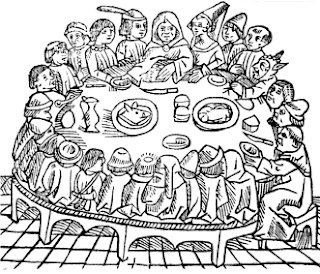The famous Chaucer phrase 'The guilty think all talk is of themselves' is often quoted, but rarely properly attributed to its source and written in its original form.
It is from 'The Prologue to the Canon's Yeoman's Tale' and in its original Middle English form appears as below in The Canterbury Tales:This Canon drew him near, and heard all thing
Which this Yeoman spake, for suspicion
Of menne's speech ever had this Canon:
For Cato saith, that he that guilty is,
Deemeth all things be spoken of him y-wis;
A modern translation of this passage, gives us the well-known quote:
In came the Canon, hearing him discuss,
To listen closer; his suspicious head
Distrusted anything that people said.
Cato has said a guilty conscience delves;
The guilty think all talk is of themselves
The context is that the Canon overhears the Yeoman and asks him to hold his tongue. Indeed part of the Yeoman's tale describes the somewhat dubious business of the Canon who is also an alchemist which explains his likely guilty conscience.
The meaning of the phrase describes the effect of a guilty conscience, the paranoia of those who have done wrong who fear that they will be exposed and thus suspect that people are talking of them and their deeds.
The passage refers to 'Cato' who coined the phrase that Chaucer refers to. He was Marcus Porcius Cato, Cato the Elder*, who was a Roman soldier, senator and historian and wrote the Carmen de moribus (Poem on morality). This includes the line "Conscius ipse sibi de se putat omnia dici" which can be translated as "The conspirator believes that everything spoken refers to himself." So, not a direct re-quotation, but a rewording of the phrase.
* Not to be confused with his great grandson, Cato the Younger, who was also called 'Marcus Porcius Cato'!





